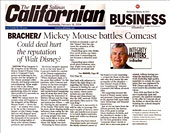Integrity
Matters
February 18, 2004
Mickey
Mouse battles Comcast – Could deal hurt
the reputation of Walt Disney?

 Question: (E-093)
Question: (E-093)
Dear
Jim:
What
happens to the integrity of the Mickey Mouse brand if
Disney Corp. sells to Comcast? I have grown up believing
in the quality and the integrity of the Disney promise:
child-friendly and family-centered entertainment. What
might be at risk to the Disney image with Comcast's
likely unrelenting drive for immediate profits if it succeeds
in closing the deal?
 Response:
Response:
We
cannot know for certain what will happen to the integrity
of the Mickey Mouse brand – down the road –
no matter who owns it. As far as the Comcast's impact
on the Disney image, that too will depend upon the leadership
of Comcast, the demands of its investors and the buying
habits of those who choose Disney products and services.
However, Integrity appears to be at the very heart of
Comcast's battle for control of the Disney organization.
An African proverb states: "When elephants fight,
it is the grass that suffers." In this instance,
with Comcast and Disney as the heavyweights doing battle,
the world of high finance, brinksmanship and sophisticated
bargaining may be more the issue than protecting the innocence
of Mickey Mouse and the long history of making PG movies
and instructive videos – safe for viewing by any
member of the family. This battle may be more about shaping
media influence than caring for the needs of future generations
of young people who may have never fallen in love with
a Mouseketeer or sobbed when Old Yeller was hurt.
Posturing by these power-brokers is certainly a part of
this "dance" that has captured the attention
of the viewing public.
Depending upon who "blinks" first, stock prices
can determine how a controlling bid can become a minority
position.
Depending upon which stock given investors own, they might
more easily be influenced on which side they back with
reference to what is the right thing to do regarding the
Disney deal. Comcast is bidding for one of the entertainment
industry's top names, whose assets include not only
Mickey Mouse and Disneyland; but also the ABC network,
ESPN and classic films such as "The Lion King."
If Comcast is successful, it will be able to leverage
Disney's wealth of history, materials and intellectual
property to build digital entertainment and video-on-demand
systems.
For those who have visited Disneyland parks and enjoyed
the family-oriented nature of the brand, it is not surprising,
at least for those on the outside who don't assess
the raw economics of the situation - that Disney's
board of directors "unanimously" rejected
Comcast's $48 billion, all stock offer.
Not surprising because the brand of Disney seems warm
and personal. Comcast's image, so far, appears built
upon hardware, technology and financial transactions.
Just as we can learn from the African proverb, the destruction
of the grass is certain when elephants do battle, and
the situation is similar to the suffering of values that
is likely for the next generation when "corporate
titans" decide to enter into a zero-sum game of
control, without having provided the intellectual framework
(including high-quality materials) to sustain the reputation
that was originated by Walt Disney and those who were
loyal to his priorities and values.
Even with any flaws in Disney's leadership (past
and present), the question remains: Is this offer by Comcast
about the dollars or about the risk of violating the cultural
integrity of our society?